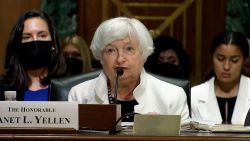US Treasury Secretary Janet Yellen conceded on Tuesday that inflation is at “unacceptable levels,” but she also sought to underscore that this is not a problem exclusive to the United States.
“Putin’s war in Ukraine is having impacts on energy and food prices globally,” Yellen told lawmakers. “We are not the only country experiencing inflation. You can see that in virtually every developed country around the world.”
Speaking during a Senate Finance Committee hearing, Yellen pointed to the Biden administration’s record-setting release of oil from the Strategic Petroleum Reserve.
“Energy and gasoline prices, while very high, they would be higher without that,” Yellen said.
Still, the Treasury secretary emphasized that the United States is not immune to global energy shocks.
“We are part of global oil markets that are subject to geopolitical influences. Given the global nature of these markets, it’s virtually impossible for us to insulate ourselves from shocks like the ones that are occurring in Russia that move global oil prices,” Yellen said. She added that it is critical that the United States become “more dependent on the wind and the sun that are not subject to geopolitical influences.”
During her prepared remarks, Yellen acknowledged that the United States faces “macroeconomic challenges, including unacceptable levels of inflation.”
Yellen called on lawmakers to take action to address high inflation.
“I believe there’s a lot that Congress can do to ease the cost burdens that households are experiencing,” Yellen said. Specifically, she pointed to investments in lowering prescription drug costs, investing in clean energy, investing in affordable housing and helping families with child care expenses and medical costs.
It will take time to get inflation under control, Yellen said.
“There’s no question we have huge inflation pressures. Inflation is our top economic problem at this point,” Yellen told lawmakers. “It’s critical that we address it. I do expect inflation to remain high, although I very much hope it will be coming down.”
Echoing comments she made last week to CNN’s Wolf Blitzer, Yellen explained that her previous expectation that inflation would be “transitory” did not account formultiple Covid-19 variants scrambling supply chains nor Russia’s invasion of Ukraine.
“As Chair Powell indicated, both of us probably could have used a better term than‘transitory,’” Yellen said, referring to Federal Reserve Chairman Jerome Powell’s previous call to retire the term.
Asked if high inflation could be partly due to the American Rescue Plan stimulus package that President Joe Biden signed in early 2021, Yellen explained that the president was deeply worried about the economy at the time.
“He had to decide what was an appropriate policy to address what all of us thought at that time was the greatest risk facing our country: that we are seeing cars line up at food banks, people going hungry, people beginning to lose the roofs over their heads, worried they wouldn’t be able to get their jobs and we would have a generation scarred by high unemployment,” Yellen said.
The Treasury secretary said the United States faced a “really horrendous” problem at the time, with the Congressional Budget Office projecting unemployment in excess of 9%.
Yellen said thestimulus packagesucceeded in addressing the economic risks “better than anyone could have anticipated,” resulting in one of the lowest unemployment rates in post-war history.
ButYellen did not appear to share the views of Senator Elizabeth Warren and other progressives who have blamed corporate greed for higher prices.
Instead, she pointed to other factors.
“I guess I see the bulk of inflation as reflecting demand and supply factors,” Yellen told lawmakers. “On the supply side, we’ve had huge supply chain issues due to the pandemic and shifts in the pattern of consumption away from services and towards goods.”
The Treasury secretary also cited “enormous increases” in food and energy prices, partly reflecting Russia’s invasion of Ukraine.
Democratic Senator Sherrod Brown later called out potential examples of corporate greed, arguing that shipping companies, oil companies, drug makers and others have “used the war in Russia to raise profits.” Brown said these companies’ big profits are “not by accident.”























